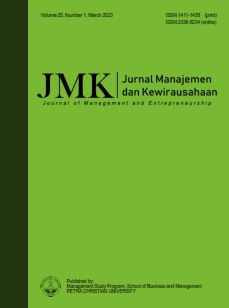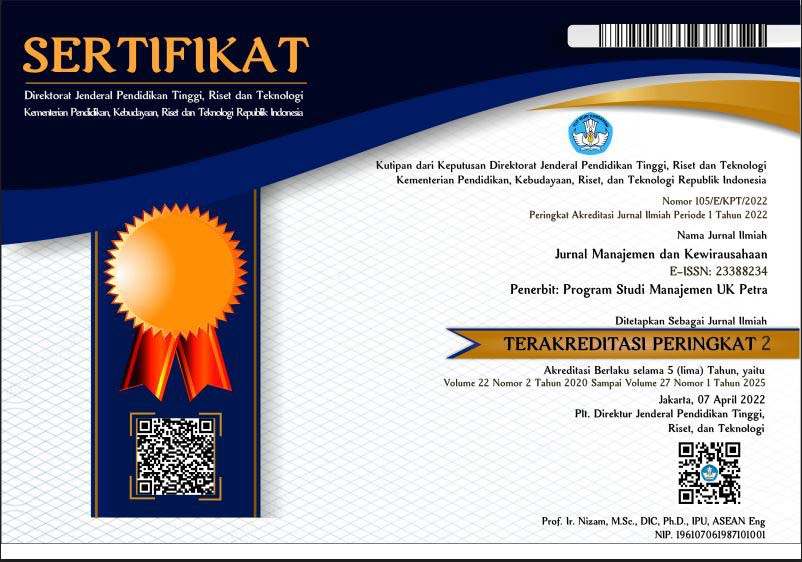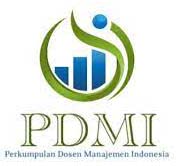INTRAPRENEURSHIP OF MIDDLE-LEVEL MANAGERS: HOW TO TRIGGER THEIR ACHIEVEMENT MOTIVATION?
DOI:
https://doi.org/10.9744/jmk.25.1.1-12Keywords:
Work environment, reward system, management support, job satisfaction, achievement motivationAbstract
This research aimed to find a way to trigger the achievement motivation of middle-level managers as intrapreneurs. It was quantitative research with data collected from 41 store managers in a national bicycle retail chain in Indonesia through 32-Likert scale questions. Path analysis measures the effect of three independent variables and one intervening variable on a dependent variable. The findings indicated that the achievement motivation of a middle-level manager was directly affected by the reward system and job satisfaction. However, they need management support to become intrapreneurs in the retail business. Management support had a significant direct effect on job satisfaction and a significant indirect and direct effect on achievement motivation. The work environment, reward system, and management support simultaneously directly affected achievement motivation. In short, these findings encourage companies to focus on management support to trigger the achievement motivation of middle-level managers. Job satisfaction, reward system, and work environment also contribute to reaching this objective consecutively.
References
Aarakit, S. M., & Kimbugwe, F. K. (2015). The relation¬ship between intrapreneurial orientation and firm performance. Global Advanced Research Journal of Social Science, 4(1), 6–10.
Abuhashesh, M., Al-Dmour, R., & Masa’deh, R. (2019). Factors that affect employees' job satisfaction and performance to increase customers' satisfactions. Journal of Human Resources Management Research, 2019(2019), 1–23. DOI: 10.5171/2019.354277
Arquisola, M. J., & Ahlisa, S. U. W. (2020). Do learning and development interventions motivate employees at PT Danone Indonesia? Applying McClelland's Theory of Motivation to FMCG Industries. Firm Journal of Management Studies, 4(2), 160–176.
Baruah, B., & Ward, A. (2015). Metamorphosis of intrapreneurship as an effective organizational strategy. International Entrepreneurship Management Journal, 11, 811–822. https://doi.org/10.1007/s11365-014-0318-3
Belasen, A., & Luber E. B. (2017). Innovation implementation: Leading from the middle out. In Pfeffermann, N., & Gould, J. (Eds.), Strategy and communication for innovation: Integrative perspective on innovation in the digital economy third edition (pp. 229–243), Springer. https://doi.org/10.1007/978-3-319-49542-2_14
Bos, T. (2015). The ways middle managers can be involved in the strategy process in a dynamic environment. Unpublished bachelor thesis, University of Twente, Enschede, Netherlands.
Čelebić, N., Šunje, A., Kulović, D., & Cero, E. (2016). Middle management involvement in the process of strategic decision making in middle enterprises in Federation of Bosnia and Herzegovia. BH Ekonomski Forum, 7(1), 41–58.
Collins, C. J., Hanges, P. J., & Locke, E. A. (2009). The relationship of achievement motivation to entrepreneurial behavior: A meta-analysis. Human Performance, 17(1), 95–117. https://doi.org/10.1207/S15327043HUP1701_5
Darma, P. S., & Supriyanto, A. S. (2017). The effect of compensation on satisfaction and employee performance. Management and Economics Journal, 1(1), 69–78. https://doi.org/10.18860/mec-j.v1i1.4524
Dasgupta, M. (2015). Middle level managers and strategy: Exploring the influence of different roles on organisational performance. Journal of Gene-ral Management, 41(1), 25–43. https://doi.org/10.1177/030630701504100103
Dehkordi, N. S. (2018). The impact of reward system on job satisfaction: A moderation effect of age and tenure. Unpublished master thesis, Girne American University, Karmi, Cyprus.
Dhewanto, W. (2013). Intrapreneurship: Kewirausahaan korporasi. Bandung: Rekayasa Sains
Eerde, W. V. (2014). Wiley encyclopedia of management. London: John Wiley & Sons.
Enginoğlu, D., & Arikan, C. L. (2016). Creating a corporate entrepreneurship strategy for competitive advantage. International Review of Economics and Management, 4(1), 14–28.
Engle, R. L., Lopez, E. R., Gormley, K. E., Chan, J. A., Charns, M. P., & Lukas, C. V. D. (2017). What roles do middle managers play in the implementation of innovative practices? Health Care Management Review, 42(1), 14–27. https://doi.org/10.1097/HMR.0000000000000090
Falola, H. O., Salau, O. P., Olokundun, M. A., Oyafunke-Omoniyi, C. O., Ibidunni, A. S., & Oludayo, O. A. (2018). Employees’ intra-preneurial engagement initiatives and its influence on organisational survival. Business: Theory and Practice, 19, 9–16. https://doi.org/10.3846/btp.2018.02
Friebel, G., Heinz, M., & Zubanov, N. (2018). Middle managers, communication, personnel turnover, and sales: A long-term field experiment in a retail chain. SSRN Electronic Journal. https://doi.org/10.2139/ssrn.3232711
Gawke, J. C., Gorgievski, M. J., & Bakker, A. B. (2019). Measuring intrapreneurship at the individual level: Development and validation of the employee intrapreneurship scale (EIS). European Management Journal, 37, 806–817. https://doi.org/10.1016/j.emj.2019.03.0 01
Hajdukova, A., Klementova, J., & Klementova Jr., J. (2015). The job satisfaction as a regulator of the working behaviour. Procedia – Social and Behavioral Sciences, 190, 471–476. https://doi.org/10.1016/j.sbspro.2015.05.028
Hakim, A. (2020). Effect of compensation, career development, work environment on job satisfaction and its impact on organizational commitment in PT Jakarta Tourisindo. Journal of Critical Reviews, 7(12), 538–548. https://doi.org/10.31838/jcr.07.12.99
Inuwa, M. (2016). Job satisfaction and employee performance: An empirical approach. The Millenium University Journal, 1(1), 90–103.
Javed, M., Balouch, R., & Hassan, F. (2014). Determinants of job satisfaction and its impact on employee performance and turnover intentions. International Journal of Learning & Development, 4(2), 120–140. https://doi.org/10.5296/ijld.v4i2.6094
Johansson, E., & Svensson, J. (2017). Implement¬ing strategy? Don’t forget the middle managers: Strategy implementation from a middle management perspective. Unpublished master thesis, Luleå Tekniska Universitet, Luleå, Sweden.
Kanter, R. M. (2004, July-August). The middle manager as innovator. Harvard Business Review. Retrieved from https://hbr.org/2004/07/the-middle-manager-as-innovator
Katz, R. L. (1955). Skills of an effective administrator. Harvard Business Review, 33(1), 33–42.
Katz, R. L. (1974). Skills of an effective administrator. Harvard Business Review, 52(5), 90–102.
Kealy, T. (2015). Do middle managers contribute to their organisation’s strategy? International Journal of Humanities and Social Science, 5(1), 108–116.
Klagge, J. (1996). The leadership role of today’s middle manager. Journal of Leadership & Organizational Studies, 3(3), 11–19. https://doi.org/10.1177/107179199700300303
Knox, S., & Marin-Cadavid, C. (2022). A practice approach to fostering employee engagement in innovation initiatives in public service organisations. Public Management Review, 1–26. https://doi.org/10.1080/14719037.2022.2055775
Kör, B., Wakkee, I., & van der Sijde, P. (2021). How to promote managers’ innovative behavior at work: Individual factors and perceptions. Technovation, 99. https://doi.org/10.1016/j.technovation.2020.102127
Kumarasinghe, S., & Hoshino, Y. (2010). The role and perceptions of middle managers and their influence on business performance: The case of Sri Lanka. International Business Research, 3(4), 3–16. https://doi.org/10.5539/ibr.v3n4p3
Kurnia, A., & Simarmata, M. (2014). Intrapreneurship dan pengambilan keputusan pada manajer toko modern. Jurnal Psikologi Udayana, (S.I.), 63–73.
Leader, G. (2004). Further education middle ma¬nagers: Their contribution to the strategic decision-making process. Educational Management Administration & Leadership, 32(1), 67–79. https://doi.org/10.1177/17411432040 39300
Lee, S., & Teece, D. J. (2013). The function of middle and top management in the dynamic capabilities framework, Kindai Management Review, 1, 28–40.
Mahmoud, M. A., Ahmad, S. B., & Poespowidjojo, D. A. L. (2018). The role of personality and intra-preneurial behavior on individual performance: Data screening and preliminary analysis. Asian Journal of Multidisciplinary Studies, 6(2), 38–46.
Marchisotti, G. G., Domingos, M. D. L. C., De Alme-ida, R. L. (2017). Decision-making at the first management level: The interference of the orga-ni¬zational culture. Human and Social Management, 19(3), 2–26. https://doi.org/10.1590/1678-6971/eRAMR180106
McDowell, T. C. (2017). A comprehensive study of intrapreneurship as a cultural form of innovation and sustainable competitive advantage. Unpublished doctoral dissertation, Florida Institute of Technology, Melbourne, USA.
Merkel, J., Jackson, P., & Pick, D. (2010). Retailing in the 21st century: Current and future trends. London: Springer.
Muizu, W. O. Z., & Sule, E. T. (2017). Manajer dan perangkat manajemen baru. Jurnal Pendidikan Ekonomi dan Bisnis, 9(2), 151–160.
Nannings, E. R. H. (2017). Middle managers’ roles and behaviours during organizational change: A qualitative study among managers and employees. Master thesis. University of Twente, Enschede, Netherlands. Retrieved from https://essay.utwente.nl/72977/1/Thesis%20Elise%20 NanningsFinal_2.pdf
Nazir, T., Khan, S., Shah, S. A., & Zaman, K. (2013). Impact of rewards and compensation on job satisfaction: Public and private universities of UK. Middle-East Journal of Scientific Research, 14(3), 394–403. DOI:10.5829/idosi.mejsr.2013.14.3.314
North, J. J. (2015). Individual intrapreneurship in organisations: A new measure of intrapreneurial outcomes. Unpublished doctoral dissertation, University of York, York, England.
O’Shannassy, T. (2014). Investigating the role of middle managers in strategy-making process: An Australian mixed method study. Journal of Management & Organisation, 20 (2), 187–205. https://doi.org/10.1017/jmo.2014.29
Peterson, T. O., & Fleet, D. D. (2004). The ongoing legacy of R. L. Katz: An updated typology of management skills. Management Deci-sion, 42(10), 1297–1308. https://doi.org/10.1108/00251740410568980
Pinchot, G. (1986). Intrapreneuring: Why you don’t have to leave the corporation to become an entrepreneur? Boston: Harper & Row.
Rasmi, Amrullah, A., & Sumardi. (2017). Compensation and motivation effect to employees’ job satisfaction. Hasanuddin Economics and Busi-ness Review, 1(2), 162–167. https://doi.org/10.26487/hebr.v1i2.1188
Rezvani, Z. (2017). Who is a middle manager: A literature review, International Journal of Family Business Management, 1(2), 1–9.
Rouleau, L., & Balogun J. (2011). Middle managers, strategic sensemaking, and discursive competence. Journal of Management Studies, 48(5), 953–983. https://doi.org/10.1111/j.14676486. 2010.00941.x
Seyedinejat, S. S., Razaghi, M. E., & Dousti, M. (2014). Prioritizing managerial skills based on Katz’s Theory: Case study of the mana¬gers of sports and youth in Mazandaran Province. Pamukkale Journal of Sport Sciences, 5(1), 33–47.
Shaju, M., & Durai, S. (2017). A study on the impact of job satisfaction on job performance of employees working in automobile industry, Punjab, India. Journal of Management Research, 9(1), 117–130. https://doi.org/10.5296/jmr.v9i1.10420
Sigmund, M., Kvintová, J., Hanuš, R., Bartková, L., & Hobza, V. (2014). Achievement motivation and its structure in middle and top managers in the pharmaceutical industry in The Czech Republic. Ekonomika & Management, 4, 1–16.
Stodnick, T. M. (2005). Driving retail store performance: A service profit chain perspective. Unpublished doctoral dissertation, The Ohio State University, Columbus, USA.
Timotius, E. (2018). Pola pikir kewirausahaan korporasi pemimpin toko ritel: Grounded theory. Unpublished doctoral dissertation, Universitas Negeri Jakarta, Jakarta, Indonesia.
Timotius, E., Hamidah, & Wibowo. (2018). Intrapreneurial mindset of retail store leader: A grounded theory. International Journal of Entrepreneurship, 22(3), 1–15.
Urquhart, R., Kendell, C., Folkes, A., Reiman, T., Grunfeld, E., & Porter, G. A. (2018). Making it happen: Middle managers’ roles in innovation implementation in health care. Worldviews on Evidence-based Nursing, 15(6), 414–423.
Wangechi, B., Kiragu, D., & Sang, A. (2018). Role of reward systems on job satisfaction of employees in the County Government of Nyeri, Kenya. International Journal of Academic Research in Accounting, Finance, and Management Sciences, 8(1), 196–204. http://dx.doi.org/10.6007/IJARAFMS/v8-i1/4045
Werdhiastutie, A., Suhariadi, F., & Partiwi, S. G. (2020). Achievement motivation as antecedents of quality improvement of organizational human resources. Budapest International Research and Critics Institute Journal, 3(2), 747–752. https://doi.org/10.33258/birci.v3i2.886
Widya-Hastuti, A. Talib, N. B. A., Wong, K. Y., & Mardani, A. (2016). The role of intrapreneurship for sustainable innovation through process innovation in small and mediumsized enterprises: A conceptual framework. International Journal of Economics and Financial Issues, 6(3S), 83–91.
Wooldridge, B., & Floyd, S. W. (1990). The strategy process, middle management involvement, and organizational performance. Strategic Management Journal, 11(3), 231–241. https://doi.org/10.1002/smj.4250110305
Wooldridge, B., Schmid, T., & Floyd, S. W. (2008). The middle management perspective on strategy process: Contributions, synthesis, and future research. Journal of Management, 34(6), 1190–1221. https://doi.org/10.1177/0149206308324326
Zenzen, T. G. (2002). Achievement motivation. Unpublished master thesis, University of Wisconsin-Stout, Menomonie, USA.
Downloads
Published
How to Cite
Issue
Section
License
Authors who publish on this journal agree to the following terms:
- Authors retain copyright and grant the journal right of first publication with the work simultaneously licensed under a Creative Commons Attribution License that allows others to share the work with an acknowledgement of the work's authorship and initial publication in this journal.
- Authors are able to enter into separate, additional contractual arrangements for the non-exclusive distribution of the journal's published version of the work (e.g., post it to an institutional repository or publish it in a book), with an acknowledgement of its initial publication in this journal.
- Authors are permitted and encouraged to post their work online (e.g., in institutional repositories or on their website) prior to and during the submission process, as it can lead to productive exchanges, as well as earlier and greater citation of published work (See The Effect of Open Access).


















